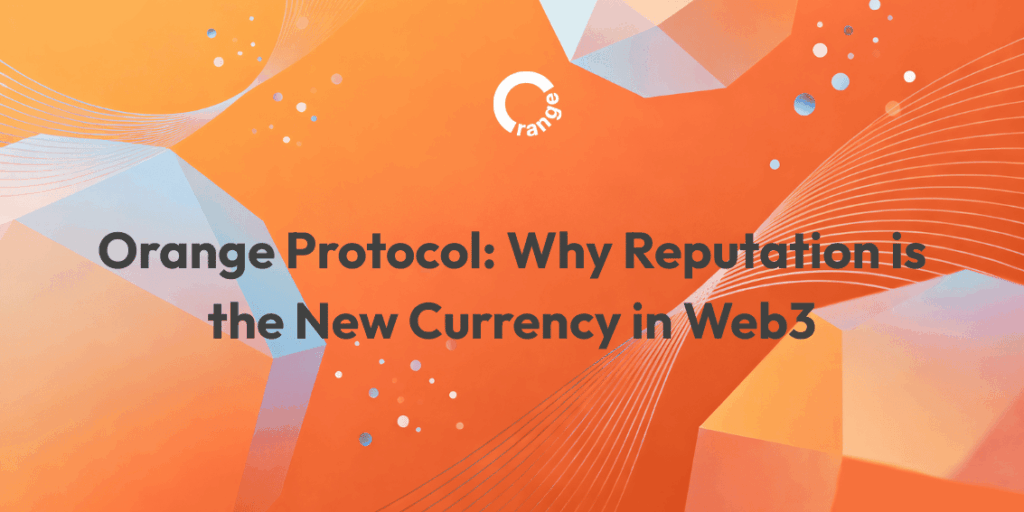Trust has always been the foundation of human interaction. But in the digital world of Web3, traditional trust systems just don’t cut it anymore.
Orange Protocol is shaking up Web3 by building trustless, decentralized reputation systems that act as the new currency for digital interactions. Instead of waiting on banks or governments to vouch for who you are, you get to build and own your reputation from the ground up.
Your online moves—DeFi trades, DAO votes, whatever—leave a digital footprint that tells your story. Orange Protocol grabs this data and turns it into a portable reputation score you can take anywhere in Web3.
So you don’t have to start from scratch every time you try a new project or platform. That’s a relief, right?
Reputation-based systems are already popping up throughout DeFi, NFT marketplaces, and gaming. As Web3 keeps expanding, your reputation could unlock better lending rates, special access, or trusted roles in communities.
If you get how this new system works, you’re already ahead in the fast-changing digital economy.
The Rise of Reputation as a Currency in Web3
Web3 faces some gnarly trust issues—old-school verification systems just can’t keep up with the decentralized chaos of blockchain. Digital identity needs to move past centralized platforms and become something portable, verifiable, and totally user-controlled.
Limitations of Traditional Trust Mechanisms: How this relates to Orange Protocol
Centralized authorities—banks, credit agencies, governments—still hold most of the cards when it comes to verifying identity and tracking behavior. That’s a problem when you want to jump into decentralized spaces, where no one’s in charge.
Try taking your credit score or social media clout into a Web3 app. You can’t. Your on-chain behavior and real-world credentials just don’t connect.
Key Problems with Centralized Trust:
- Single points of failure
- Limited data portability
- Geographic restrictions
- Privacy concerns
Orange Protocol tackles these problems by building trustless reputation systems that work everywhere. You keep control of your data and prove authenticity with cryptography, not paperwork.
They cut out the middlemen using zkTLS. You get to verify web data without showing third parties your sensitive info.
Importance of Decentralized Reputation how this relates to Orange Protocol
Decentralized reputation flips the script on trust in Web3. Now, your reputation follows you around—no need to beg a centralized gatekeeper for permission.
Reputation is the new currency because it opens doors: services, lending, governance, all based on your actual track record, not some ancient credential.
Benefits of Decentralized Reputation:
- Self-sovereignty: You own and control your reputation data
- Interoperability: Reputation works across multiple blockchain networks
- Transparency: All interactions remain verifiable on-chain
- Composability: Different reputation metrics combine to create comprehensive scores
Orange Protocol lets you generate custom reputation reports from both on-chain and off-chain data. It bridges Web3 and Web2 data for a more complete identity profile.
Your decentralized reputation can get you under-collateralized loans, DAO access, or entry into exclusive communities—all based on what you’ve actually done.
The Evolution of Digital Identity in Decentralized Environments how this relates to Orange Protocol
Digital identity in decentralized spaces needs new ideas—privacy first, but still verifiable. Your identity isn’t a government-issued doc anymore; it’s a stack of cryptographic proofs.
Web3 identity systems pull in data from everywhere: DeFi, NFTs, governance, social. You end up with a rich digital persona.
Components of Web3 Digital Identity:
- On-chain transactions and smart contract interactions
- Governance tokens held and voting history
- NFT ownership and trading patterns
- DeFi activity including lending and staking behavior
- Social verification through multiple platforms
Orange Protocol’s Orange Humanity Score (OHS) is a solid example of how digital identity is evolving. The system proves you’re real without giving up your privacy, using zero-knowledge proofs.
Your digital identity becomes programmable and composable. Apps can grab only the reputation metrics they need, without you oversharing.
Expanding to Base Chain means Orange Protocol can update reputations faster and cheaper. That opens the door for more users to get in on comprehensive reputation tracking.
How Orange Protocol Powers Trustless Reputation
Orange Protocol builds a decentralized framework that changes how reputation data gets verified, stored, and used in Web3. The platform mixes advanced crypto with user-controlled identity, running reputation systems with no central authority in sight.
Overview of Orange Protocol’s Architecture
Orange Protocol acts as a decentralized identity and reputation platform, processing reputation data across multiple blockchains. They separate reputation computation from storage, so you keep your identity data close and safe.
Zero-knowledge proofs, specifically zkTLS, let you verify Web2 data (like Twitter followers or exchange balances) without showing anyone your private details.
Core architectural components include:
- Decentralized verification nodes for processing reputation claims
- Cross-chain bridges for reputation portability
- Cryptographic attestation systems to guarantee data integrity
- User-controlled wallets storing reputation credentials
Orange Protocol calculates your reputation scores using data from both Web3 and Web2. They pull together on-chain history, social activity, and verified credentials for a full-spectrum profile.
Building Portable and Privacy-Preserving Reputation
With Orange Protocol’s trustless system, your reputation goes where you go. It’s not locked to any one app or platform.
The Orange Pass is your main tool for managing reputation credentials. You can pick and choose which data to share with which apps—finally, some real control.
Privacy gets a boost from selective disclosure. You reveal only what you want, depending on the situation:
| Verification Type | Data Revealed | Privacy Level |
| Account Ownership | Verification status only | High |
| Follower Thresholds | Range confirmation | Medium |
| Asset Balances | Threshold met/not met | High |
Thanks to zkTLS, you can prove your claims about accounts on Twitter, Discord, or exchanges—without revealing the raw data. That’s a privacy win.
Reputation, Credentials and Flexible Reporting
Orange Protocol gives you verifiable credentials for different reputation aspects. Think of these like digital badges—proof of what you’ve done, no need for constant re-checks.
The Orange Humanity Score (OHS) is their flagship metric, combining multiple verification sources. It goes up as you rack up more attestations and show positive behavior across platforms.
Supported verification categories include:
- Social media ownership and engagement
- Exchange KYC status and trading history
- DeFi protocol and governance activity
- Educational and professional certifications
With Orange Reputation Studio, you get flexible reporting tools to show off your reputation however you like. Granular permission controls let you decide who sees what, down to the detail.
Ongoing verification keeps your credentials fresh. If your underlying data changes, your reputation updates—no stale scores here.
Core Components: Data, Models, and Verification
Orange Protocol’s reputation engine stands on three legs: collecting data from all over, flexible modeling to fit different needs, and secure verification that keeps your privacy intact.
Role of On-Chain and Off-Chain Data Sources
Your reputation score pulls from both blockchain and traditional sources. Orange Protocol aggregates data and Web3 models for a full view of your digital identity.
On-chain data sources include:
- Transaction history and wallet activity
- Smart contract interactions
- Asset ownership and trading
- DeFi protocol participation
Off-chain data sources go beyond blockchain:
- Social media activity
- Gaming achievements and purchases
- Professional credentials
- IoT device data—location, health, etc.
Orange Protocol processes all this, weighing your on-chain moves and off-chain actions. You decide what gets linked, so your profile is as complete as you want it to be.
Custom Reputation Models and Metrics
Forget one-size-fits-all scores. Orange Protocol lets platforms build their own reputation models. The system offers proven data models for analyzing reputation in context.
Key reputation metrics:
- Proof of Commitment: Tracks long-term engagement
- Evidence of Influence: Measures your impact
- Evidence of Community Support: Shows peer recognition
You get custom algorithms tailored to each platform. A DeFi app might care about your lending risk; a game might look at your achievements and fair play.
Platforms can blend their own data with outside sources. That flexibility means your reputation actually matches what matters for each use case.
Outputs can be scores, NFTs, credentials, or reports—whatever the platform wants.
Secure Verification with zkTLS
zkTLS lets Orange Protocol check your data without leaking private info. Zero-knowledge proofs keep your details safe while proving authenticity.
When you link accounts or share credentials, zkTLS creates cryptographic proofs instead of exposing raw data. Only the proof gets sent out.
No more worrying about data breaches or snooping. Your info stays encrypted, but your reputation credentials still get verified.
Orange Protocol uses zkTLS across all sorts of sources—social, financial, professional. Data integrity stays tight, privacy stays intact.
Platforms can trust the scores and credentials, knowing the underlying data is legit, even if they never see it.
Real-World Applications and Use Cases
Orange Protocol is changing how decentralized platforms verify user credibility. Reputation-based systems now shape lending, governance, gaming, and compliance in Web3. These real-world applications show that reputation isn’t just theory—it’s practical, and honestly, overdue.
DeFi Platform Enhancements
In traditional finance, your credit score decides if you get a loan. DeFi, though, just doesn’t have that critical data layer. Orange Protocol flips the script by offering reputation-based lending and credit scoring apps that dig into your on-chain behavior.
Platforms can finally size up borrower reliability, making collateralized DeFi lending way more efficient. Your transaction history, liquidity moves, and repayment habits all come together to form a detailed reputation profile.
DeFi protocols can now roll out:
- Dynamic interest rates that react to reputation scores
- Lower collateral requirements for users who’ve earned trust
- Automated risk assessment handled by smart contracts
This method slashes default risk and opens up capital for solid participants. Suddenly, your DeFi track record isn’t just a history—it’s leverage for better terms.
DAOs and Sybil Resistance
DAO governance has a glaring weakness: people spinning up fake identities to sway votes. Orange Protocol steps in with Sybil-resistant identity verification tools.
Now, voting power in DAOs can actually reflect what you contribute—not just how many tokens you hold. The protocol keeps tabs on signals like work, donations, and quality of participation.
Core Sybil resistance features:
- Linking identities across platforms
- Analyzing behavioral patterns
- Verifying social graphs
- Tracking historical contributions
These features make vote buying a headache and let real community members lead. Your reputation travels with you across DAOs, so you don’t have to start from scratch with every new org.
GameFi and SocialFi Integrations
GameFi and social apps are flooded with bots and low-effort accounts. Orange Protocol brings reputation-based matchmaking and rewards to the GameFi table.
Your gaming wins and social moves get tallied into verifiable reputation scores. These scores decide if you get into exclusive tournaments, special NFT drops, or unlock premium perks.
SocialFi perks:
- Content curated by merit
- Follower authenticity checks
- Social tokens weighted by reputation
- Incentives for quality interactions
GameFi projects use these scores to keep things fair and distribute rewards properly. Your reputation follows you between games, so your profile actually means something wherever you play.
Token Launches and RWAs Compliance
Token launches, especially with real-world assets, need tight participant screening to satisfy regulators. Orange Protocol supplies the backbone for compliant token distribution and asset tokenization.
With a verified identity and reputation history, you get access to exclusive sales and whitelists. The protocol enforces compliance with thorough identity verification.
Compliance features for RWAs:
- KYC/AML baked in
- Accredited investor checks
- Geo-restriction enforcement
- Regulatory reporting tools
Projects and participants get protection, but decentralization isn’t sacrificed. Your reputation becomes a filter—letting in legit users and blocking out the rest.
User Engagement, Incentives, and Developer Integration
Orange Protocol shakes up user engagement with its reputation system and a full suite of dev tools. The platform actually incentivizes authentic participation and makes it dead simple for Web3 projects to plug in.
User Onboarding and Orange Humanity Score (OHS)
Your Orange Protocol journey kicks off with the Orange Humanity Score (OHS). This score lets you prove you’re human in Web3—no need to dox yourself.
The OHS uses Zero-Knowledge Proofs to check your identity. You can link up Web2 accounts via the Orange Pass Chrome extension.
Verification options:
- Socials like Twitter, LinkedIn, Discord
- Financial platforms and your transaction history
- Degrees, certificates, and other credentials
- Gaming feats and NFT ownership
Each source you verify bumps your OHS higher. The score moves with you across Web3 apps and platforms.
You always control what you share. Thankfully, the protocol never puts your raw personal info on-chain.
Incentivizing Contributions and Engagement
Orange Protocol hands out rewards for real participation, not just noise. Your actions directly shape your reputation score throughout the ecosystem.
Main engagement rewards:
- Active use: Interacting with DeFi protocols boosts your score
- Community work: Posting helpful stuff or teaching others lifts your rep
- NFT activity: Creating or trading NFTs adds to your profile
- Cross-verification: Linking more accounts proves you’re legit
The protocol tracks you across DeFi heavyweights like Uniswap, AAVE, PancakeSwap. Every positive move strengthens your reputation.
Your rep becomes a ticket to exclusives: better lending rates, early NFT access, and governance perks. The system’s no pushover—algorithms spot and penalize fake engagement fast.
Developer-Centric Integration and APIs
Orange Protocol arms devs with all the tools to build reputation into their apps. The infrastructure has APIs and SDKs for quick, painless integration.
Integration options:
- RESTful APIs for reputation lookups
- JavaScript SDKs for frontends
- Smart contract libraries for on-chain checks
- Webhooks for real-time updates
You can tweak the reputation logic to fit your use case. The protocol supports all sorts of scoring—DeFi, gaming, social, you name it.
The API lets you pull scores instantly, so your app can make calls on user trust without touching sensitive data. Docs come with code samples, and the dev team’s actually responsive if you hit snags.
Popular integration patterns:
- Lending apps using scores for credit checks
- Games rewarding top-rep players
- DAOs weighting votes by reputation
- NFT marketplaces surfacing trusted creators
Shaping the Future of Decentralized Reputation
The decentralized reputation wave is remaking trust in Web3. Cross-chain expansion and AI-powered verification are unlocking new possibilities and finally tackling some of digital identity’s biggest headaches.
Decentralized Reputation Movement and Ecosystem Impact
Your role in this movement actually shapes how trust works across Web3. Orange Protocol’s 2025 roadmap focuses on AI-driven reputation scoring, aiming for more robust verification systems.
The impact lands in three main spots:
- DAOs: You get reputation-weighted voting, cutting down on Sybil attacks
- GameFi: Bots get the boot, and economies stay fair
- SocialFi: You build up real credibility with verifiable scores
Reputation’s the new currency in Web3, honestly. Your contributions and engagement actually mean something and follow you around.
The ecosystem’s modular rep systems keep privacy in mind. You can build, share, and carry your data across platforms—no more starting over every time.
Challenges and Opportunities Ahead
Decentralized reputation isn’t a free lunch. Fraud detection gets tricky when you’re dealing with smart, persistent bad actors across chains.
Protecting your reputation from manipulation is an ongoing battle. AI has to get better at telling the difference between real and fake engagement—no easy feat.
But there’s upside:
- Credit scoring: Your on-chain history could finally count for lending
- Identity verification: You get access to services without giving up your privacy
- Cross-platform trust: Your rep works wherever you go in Web3
Orange Protocol’s frameworks aim to serve protocols, users, and devs—each with their own needs, but interoperable. You get systems that fit your use case, not just a one-size-fits-all.
Monetization strategies are already cropping up. With a verified reputation, maybe you’ll earn from NFT drops, premium access, or even governance gigs. Who knows—Web3’s just getting started with this stuff.
Expanding Digital Identity Across Chains
Your digital identity really ought to work seamlessly across multiple blockchain networks, right? Orange Protocol has integrated with high-performance blockchains like Solana, Avalanche, and Near to push cross-chain compatibility forward.
Multi-chain expansion tackles the fragmentation headaches you run into when you bounce between different blockchain ecosystems. Your reputation score actually stays consistent no matter which network you’re on.
Here’s what the integration process looks like:
| Component | Function |
| Cross-chain bridges | Transfer reputation data between networks |
| Universal scoring | Maintain consistent reputation metrics |
| Network adapters | Adjust for different blockchain requirements |
Strategic partnerships are pushing adoption across DeFi, GameFi, and NFT ecosystems. You can even embed reputation scores straight into wallets, exchanges, or dApps if you want.Your decentralized identity ends up portable and verifiable. Interoperability lets reputation data you’ve built on one chain boost your standing everywhere in the Web3 landscape.





